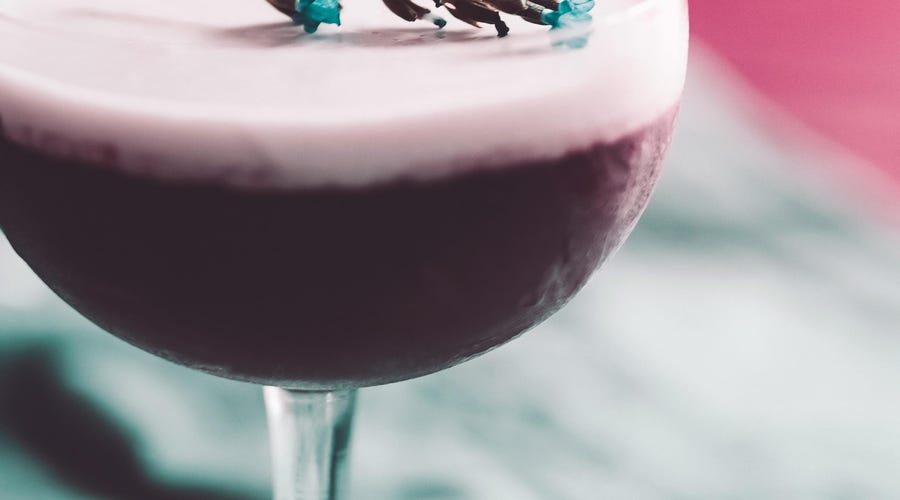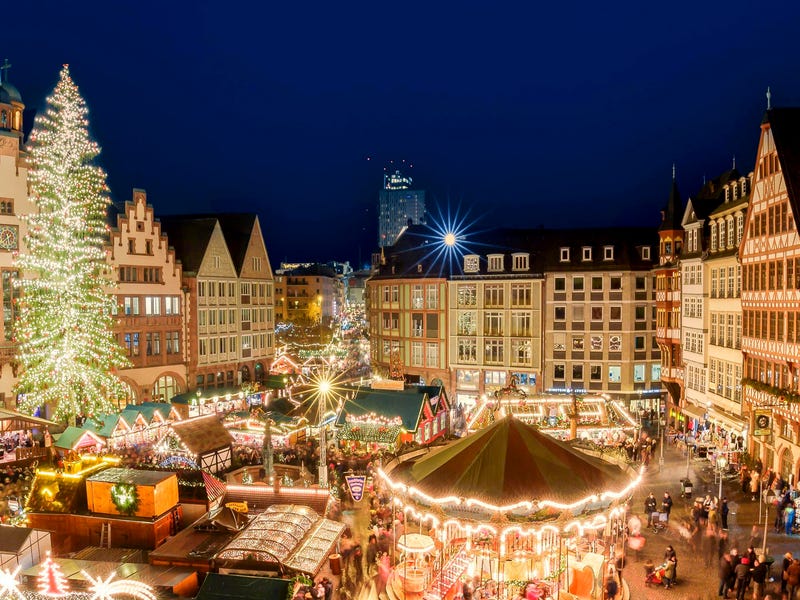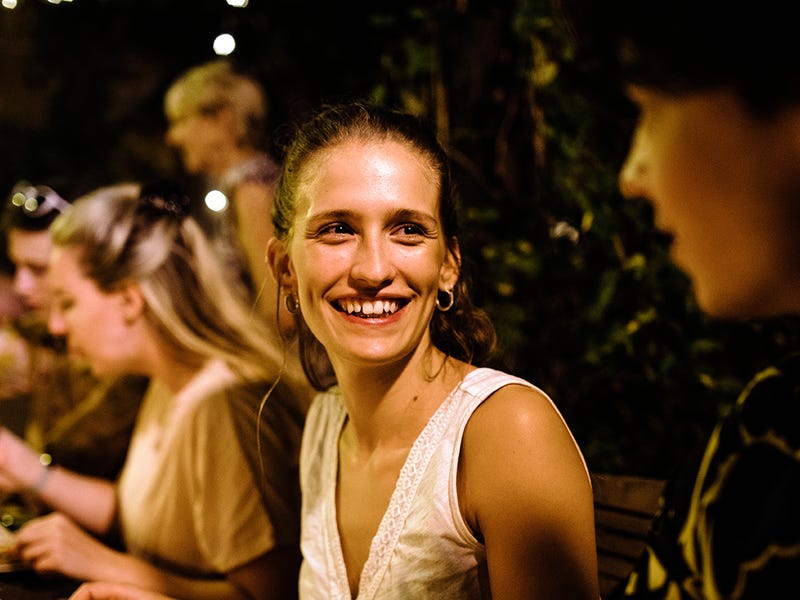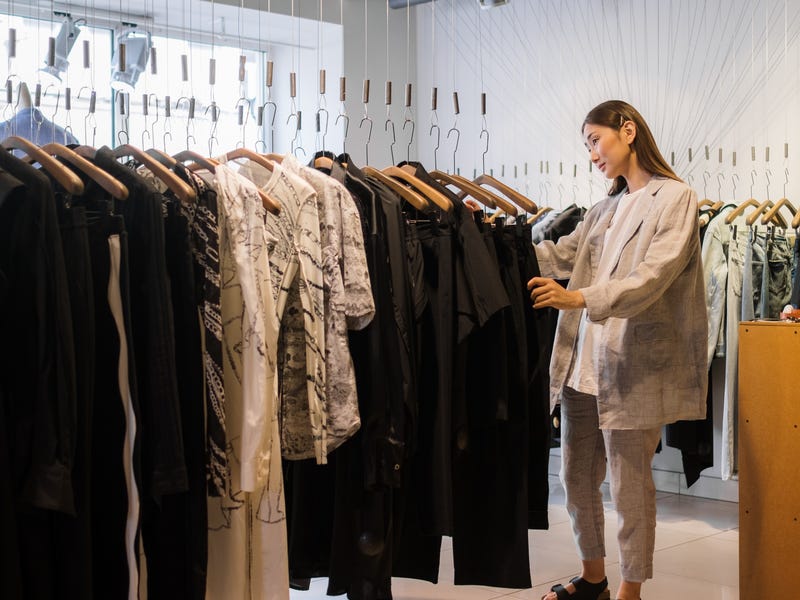Trying a country’s foods and drinks might just be our favorite part about discovering a new culture. It’s definitely the best reward for all the hard work you put into studying a new language.
So when you’re learning German, there’s a good chance you’re secretly planning a trip to Munich during the beer-heavy Oktoberfest season or dreaming of a snowy mountain get-away in the Swiss alps with a hot chocolate to warm your hands.
We’ll teach you all about the most popular drinks in German-speaking countries and how to order them.
How do you say drinks in German?
A drink or a beverage in German is “Getränk”, with the plural being “Getränke”. This can mean anything from coffee over juice to a cocktail.
If you’re specifically referring to an alcoholic drink, it’s common to use the English “drink”, for example, if you’re saying “I need a drink”: “Ich brauche einen Drink”.

How to order drinks in German
Whether you’re getting a glass of still water or a fancy cocktail with five different costume adjustments, it’s always good to know these basic phrases and expressions when ordering a drink in German.
| English | German | IPA |
|---|---|---|
| Just some water for me, please | Für mich bloß Wasser, bitte | [fy:ɐ̯ mɪç blɔs ˈvasɐ ˈbɪtə] |
| Carbonated | Mit Sprudel; Mit Kohlensäure | [mɪt ˈʃpʁuːdl̩; mɪt ˈkoːlənˌzɔɪ̯ʁə] |
| No ice | Ohne Eis; ohne Eiswürfel | [ˈoːnə aɪ̯s; ˈoːnə ˈaɪ̯sˌvʏʁfl̩] |
| Which wine do you recommend? | Welchen Wein empfehlen Sie? | [vɛlçən vaɪ̯n ɛmp͡fe:lən zi:] |
| Can I please get your sweetest white wine? | Kann ich bitte Ihren süßesten Weißwein haben? | [kan ɪç bɪtə ˈiːʁən ˈzy:səʃtən ˈvaɪ̯svaɪ̯n ha:bən] |
| Do you have a dry red wine? | Haben Sie einen trockenen Rotwein? | [ˈha:bən zi: ˈaɪ̯nən ˈtʁɔkənən ˈʁo:tvaɪ̯n] |
| Do you have local beer here? | Gibt es hier regionales Bier? | [gi:pt ɛs hi:ɐ̯ ʁeɡi̯oˈnaːləs bi:ɐ̯] |
| One bottle of your most popular beer, please | Eine Flasche Ihres beliebtesten Bieres, bitte | [ˈaɪ̯nə ˈflaʃə ˈi:ʁəs bəˈli:ptəstən ˈbi:ʁəs ˈbɪtə] |
| I’ll have a martini | Ich nehme einen Martini | [ɪç ˈne:mə ˈaɪ̯nən maɐ̯ˈti:ni:] |
| Could I have a cup of hot chocolate, please? | Könnte ich bitte eine Tasse Kakao haben? | [ˈkœntə ɪç ˈbɪtə ˈaɪ̯nə ˈtasə kaˈka:ɔ ˈha:bən] |
| One coffee with milk and a little bit of sugar, please | Einen Kaffee mit Milch und ein wenig Zucker, bitte | [ˈaɪ̯nən ˈkafe: mɪt mɪlç ʊnt aɪ̯n ˈve:nɪç ˈtsʊkɐ ˈbɪtə] |
Drinks in German
We’ll teach you how to order drinks in German, so you get exactly what you want.
Here is a breakdown of all the different popular drinks like beer and wine, coffee and tea and juice and lemonade in German.
Water in German
Keep in mind that in Germany, water costs just as much as soft drinks, so never expect free water when you go to a restaurant! Even so, it’s still by far the most popular drink in Germany.
Germans especially love sparkling water. 83% of Germans drink their water carbonated! So when you order water in Germany, make sure you specify that you want still water, if that’s what you prefer.

| English | German | IPA |
|---|---|---|
| Water | Das Wasser | [ˈvasɐ] |
| Still water | Stilles Wasser | [ˈʃtɪləs ˈvasɐ] |
| Sparkling water | Das Mineralwasser; die Selter | [mineˈʁaːlˌvasɐ; ˈzɛltɐ] |
| Tonic water | Das Tonic Water | [ˈtɔnɪk ˈwɔːtə] |
| Soda water | Das Sodawasser | [ˈzoːdaˌvasɐ] |
| A bottle of water | Eine Flasche Wasser | [ˈflaʃə ˈvasɐ] |
| Tap water | Das Leitungswasser | [ˈlaɪ̯tʊŋsˌvasɐ] |
| Spring water | Das Quellwasser | [ˈkvɛlˌvasɐ] |
| Distilled water | Destilliertes Wasser | [dɛstɪˈliːɐ̯təs ˈvasɐ] |
| Purified water | Gereinigtes Wasser | [ɡəˈʁaɪ̯nɪçtəs ˈvasɐ] |
| A glass of water | Ein Glas Wasser | [ɡlaːs ˈvasɐ] |
Cold non-alcoholic soft drinks like sodas and juices in German
If you’re looking for a refreshing non-alcoholic drink, you have plenty of delicious choices, from all kinds of fresh juices to an ice-cold German Spezi. Here is a list of soft drinks and other non-alcoholic cold drinks in German.

| English | German | IPA |
|---|---|---|
| Soda | Die Soda | [ˈzoːda] |
| Coke | Die Cola | [ˈkoːla] |
| Lemonade | Die Limonade | [limoˈnaːdə] |
| Ice Tea | Der Eistee | [ˈaɪ̯sˌteː] |
| Milk | Die Milch | [mɪlç] |
| Soy milk | Die Sojamilch | [ˈzoːjaˌmɪlç] |
| Oat milk | Die Hafermilch | [ˈhaːfɐˌmɪlç] |
| Almond milk | Die Mandelmilch | [ˈmandlmɪlç] |
| Coconut milk | Die Kokosmilch | [ˈkoːkɔsˌmɪlç] |
| Juice | Der Saft | [zaft] |
| Orange juice | Der Orangensaft | [oˈʁɑ̃ːʒn̩ˌzaft] |
| Apple juice | Der Apfelsaft | [ˈapflzaft] |
| Tomato juice | Der Tomatensaft | [toˈmaːtnˌzaft] |
| Carrot juice | Der Karottensaft | [kaˈʁɔtn̩ˌzaft] |
| Grape juice | Der Traubensaft | [ˈtʁaʊ̯bn̩ˌzaft] |
| Multivitamin juice | Der Multivitaminsaft | [ˌmʊltivitaˈmiːnˌzaft] |
| Grapefruit juice | Der Grapefruitsaft | [ˈɡʁɛɪ̯pˌfʁuːtˌzaft] |
| Currant juice | Der Johannisbeersaft | [joˈhanɪsbeːɐ̯ˌzaft] |
| Cherry juice | Der Kirschsaft | [ˈkɪʁʃˌzaft] |
| Banana juice | Der Bananensaft | [baˈnaːnənˌzaft] |
| Cherry banana blend | Der KiBa | [ˈkiːba] |
| Coconut water | Das Kokoswasser | [ˈkoːkɔsˈvasɐ] |
| Smoothie | Der Smoothie | [ˈsmuːði] |
| Green smoothie | Grüner Smoothie | [ˈɡʁyːnɐ ˈsmuːði] |
| Slushy | Der Slushy | [ˈslaʃi:] |
| Bubble Tea | Der Boba | [ˈbo:ba:] |
| Root beer | Das Rootbeer | [ruːtbiːɐ̯] |
| Spritzer | Die Schorle | [ˈʃɔʁlə] |
| Apple spritzer | Die Apfelschorle | [ˈapflˈʃɔʁlə] |
| Popular German coke with orange lemonade | Die Spezi | [ˈʃpeːt͡si] |
Hot drinks in German
In Germany, Austria and Switzerland the weather can get pretty chilly. So it’s nice to have a hot drink that keeps you warm. Start your day with a Milchkaffee, before you hit the slope on your ski trip in Tirol or grab a cup of peppermint tea, as you stroll over the famous Christmas Market in Nürnberg!
Remember these hot drinks in German - and if you’re a passionate coffee drinker who travels a lot, our helpful guide on ordering coffee around the world will make your life even easier.

| English | German | IPA |
|---|---|---|
| Tea | Der Tee | [teː] |
| Herbal tea | Der Kräutertee | [ˈkʁɔɪ̯tɐˌteː] |
| Fruit tea | Der Früchtetee | [ˈfʁʏçtəˌteː] |
| Black tea | Schwarzer Tee | [ˈʃvaʁt͡sɐ teː] |
| Green tea | Grüner Tee | [ˈɡʁyːnɐ teː] |
| Camomile tea | Kamillentee | [kaˈmɪlənteː] |
| Peppermint tea | Pfefferminztee | [ˈpfɛfɐmɪnt͡sˌteː] |
| Hot chocolate | Der Kakao | [kaˈkaʊ̯] |
| Coffee | Der Kaffee | [ˈkafe] |
| Cappuccino | Der Cappuccino | [ˌkapʊˈtʃiːno] |
| Espresso | Der Espresso | [ˌɛsˈpʁɛso] |
| Caffè Latte | Der Milchkaffee; Latte | [ˈmɪlçkaˌfeː; ˈlatə] |
| Chai Latte | Der Chai Latte | [ˈtʃaɪ̯ ˈlatə] |
| Macchiato | Der Macchiato | [makˈkiaːto] |
| Mocha | Der Mocha | [ˈmɔka] |
| Frappuccino | Der Frappuccino | [fʁappʊt͡ʃɪno:] |
| Drip coffee | Der Filterkaffee | [ˈfɪltɐˌkafeː] |
| Turkish coffee | Türkischer Kaffee | [ˈtʏʁkɪʃɐ ˈkafe] |
| Instant coffee | Der Instantkaffee; löslicher Kaffee | [ˈɪnstənt ˈkafe] |
Want to order coffee in German like a real connoisseur? You know where to go.
Cocktails and mixed alcoholic drinks in German
You can grab a cocktail in a bar or restaurant and it will be pretty easy because most cocktails are exactly the same in German and English. This will come in handy, especially if it’s your second or third cocktail and you can’t be bothered with German pronunciation anymore.
Just make sure, you never drink any of these on an empty stomach. Our German restaurant menu & dining guide will help you order some food to go with your cocktails.

| English | German | IPA |
|---|---|---|
| Margarita | Der Margarita | [maʁɡaʁita] |
| Gin tonic | Der Gin Tonic | [ˈdʒɪn ˈtɔnɪk] |
| Martini | Der Martini | [maʁˈtiːni] |
| Daiquiri | Der Daiquiri | [dajkiʁi] |
| Old Fashioned | Der Old-Fashioned | [əʊld fæʃnd] |
| Bloody Mary | Der Bloody Mary | [bladi: mɛʁi] |
| Mimosa | Der Mimosa | [miˈmoːzə] |
| Gimlet | Der Gimlet | [gi:mlət] |
| Cosmopolitan | Der Cosmopolitan | [kɔsmɔpɔlɪtɛn] |
| Manhattan | Der Manhattan | [mɛnˈhɛtn̩] |
| Negroni | Der Negroni | [ne:gʁo:nɪ] |
| Moscow Mule | Der Moscow Mule | [mɔskaʊ̯ mju:l] |
| Mojito | Der Mojito | [məʊˈhiːtəʊ] |
| Whiskey Sour | Der Whiskey Sour | [ˈvɪski ˈsaʊ̯ə] |
| Piña colada | Der Piña colada | [ˈpinja koˈlaːda] |
| Egg liqueur | Der Eierlikör | [ˈaɪ̯ɐliˌkøːɐ̯] |
| Aperol Spritz | Der Aperolspritzer | [apɛʁo:lʃpʁɪt͡sɐ] |
Beer in German
Beer in German is just “Bier”, almost the same as in English. Remember it well because it’s mandatory to at least try a German beer when you find yourself in a German-speaking country.
Of course every region will have their own specialty beers that they’re particularly proud of, so if you ask a local which beer is the best one, their answer will most likely be a little biased, depending on where they’re from. You might just have to try them all!

| English | German | IPA |
|---|---|---|
| A pint of beer | Ein Pint Bier | [pɪnt biːɐ̯] |
| Ale | Das Ale | [ɛɪ̯l] |
| Lager | Das Lager | [ˈlaːɡɐ] |
| Stout | Das Starkbier | [ˈʃtaʁkˌbiːɐ̯] |
| Craft beer | Das Craft-Bier | [krɑːftbiːɐ̯] |
| Light beer | Helles Bier | [ˈhɛləs biːɐ̯] |
| Dark beer | Dunkles Bier | [ˈdʊŋkləs biːɐ̯] |
| Non-alcoholic beer | Alkoholfreies Bier | [alkoˈhoːlˌfʁaɪ̯əs biːɐ̯] |
| Low-carb beer | Kohlenhydratarmes Bier | [ˈkoːlənhyˌdʁaːtˈaʁməs biːɐ̯] |
In fact, beer is such a big part of German culture that it deserves its own article on how to properly order a beer in German, which you can find here.
Wine in German
Wine in German is “Wein”. In Germany, wine is mostly produced in the Southwest, including the Rheingau region, Rheinhessen and Mosel Valley, home of the world famous Riesling.

| English | German | IPA |
|---|---|---|
| White wine | Der Weißwein | [ˈvaɪ̯sˌvaɪ̯n] |
| Red wine | Der Rotwein | [ˈʁoːtˌvaɪ̯n] |
| Sparkling wine | Der Sekt | [zɛkt] |
| Champagne | Der Champagner | [ʃamˈpanjɐ] |
| Prosecco | Der Prosecco | [pʁoˈzɛko] |
| Rosé | Der Rosé | [ʁoˈzeː] |
| Apple Cider | Apfelwein | [ˈap͡fl̩vaɪ̯n] |
| Mulled wine | Der Glühwein | [ˈɡlyːˌvaɪ̯n] |
| Fortified Wine | Der Likörwein | [liˈkøːɐ̯ˌvaɪ̯n] |
| Dessert wine | Der Dessertwein | [dɛˈseːɐ̯ˌvaɪ̯n] |
| Sweet wine | Süßer Wein | [ˈzyːsɐ ˌvaɪ̯n] |
| Dry wine | Trockener Wein | [ˈtʁɔkənɐ vaɪ̯n] |
| Popular German sparkling wine with elderflower syrup | Der Hugo | [ˈhuːɡo] |
| A slug of wine | Ein Schluck Wein | [aɪ̯n ʃlʊk ˌvaɪ̯n] |
| A glass of wine | Ein Glas Wein | [aɪ̯n ɡlaːs ˌvaɪ̯n] |
| A bottle of wine | Eine Flasche Wein | [ˈaɪ̯nə ˈflaʃə ˌvaɪ̯n] |
Drink-related verbs
There are many fun activities around drinks, like wine-tasting or playing drinking games. These are the respective verbs in German.

| English | German | IPA |
|---|---|---|
| To drink | Trinken | [ˈtʁɪŋkn̩] |
| To toast | Anstoßen | [ˈanˌʃtoːsn̩] |
| To sip one’s drink | An seinem Getränk nippen | [an ˈzaɪ̯nəm ɡəˈtʁɛŋk ˈnɪpn̩] |
| To be thirsty | Durst haben | [dʊʁst ˈhaːbn] |
| To be potable | Trinkbar sein | [ˈtʁɪŋkbaːɐ̯ zaɪ̯n] |
| To taste | Schmecken | [ˈʃmɛkn̩] |
| Wine tasting | Weinverkostung | [ˈvaɪ̯nfɛɐ̯ˌkɔstʊŋ] |
| To chug | Exen | [ˈɛksn̩] |
| To play a drinking game | Ein Trinkspiel spielen | [aɪ̯n ˈtʁɪŋkˌʃpiːl ˈʃpiːlən] |
| To get drunk | Sich betrinken | [sɪç bəˈtʁɪŋkn̩] |
| To be tipsy | Angetrunken sein | [ˈanɡəˌtʁʊŋkn̩ zaɪ̯n] |
| To be drunk | Betrunken sein | [bəˈtʁʊŋkn̩ zaɪ̯n] |
| To be hungover | Einen Kater haben | [ˈaɪ̯nən ˈkaːtɐ ˈhaːbn] |
Other important drink-related vocab
Here are some more drink-related words that might come in handy when you’re talking about drinks and drinking in German.
| English | German | IPA |
|---|---|---|
| Cup | Die Tasse | [ˈtasə] |
| Mug | Der Becher | [ˈbɛçɐ] |
| Glass | Das Glas | [ɡlaːs] |
| Wine glass | Das Weinglas | [ˈvaɪ̯nˌɡlaːs] |
| Champagne glass | Das Sektglas | [ˈzɛktˌɡlaːs] |
| Pint glass | Das Pint-Glas | [pɪntˌɡlaːs] |
| Sippy cup (kids) | Die Schnabeltasse | [ˈʃnabl̩ˌtasə] |
| Plastic cup | Der Plastikbecher | [ˈplastɪkˌbɛçɐ] |
| Disposable cup | Der Wegwerfbecher | [ˈvɛkˌvɛʁfˈbɛçɐ] |
| Straw | Der Strohhalm | [ˈʃtʁoːˌhalm] |
| Cheers! | Prost! | [pʁoːst] |
| With ice | Mit Eis; Mit Eiswürfeln | [mɪt aɪ̯s; mɪt ˈaɪ̯svʏʁfl̩n] |
| Without ice | Ohne Eis; Ohne Eiswürfel | [ˈoːnə aɪ̯s; oːnə ˈaɪ̯svʏʁfl̩n] |
| Bottle | Die Flasche | [ˈflaʃə] |
| Pitcher / jug | Der Krug | [kʁuːk] |
| Can | Die Kanne | [ˈkanə] |
| A shot | Der Shot | [ʃɔt] |
| Bar | Die Bar | [baːɐ̯] |
| Drink! | Trink! | [tʁɪŋk] |
Popular drinks in German-speaking countries
- Germans are big fans of “Sprudel”, passionate coffee drinkers and very laid-back about alcohol consumption.
- Water is by far the most popular drink in German-speaking countries, especially sparkling water.
- Other very popular bubbly German drinks are Apfelschorle (apple spritzer) and Spezi, a mixture of coke and orange soda.
- If you’re not into carbonated drinks, try a KiBa! This is a blend of cherry juice (Kirschsaft) and banana juice (Bananensaft), especially popular in summer.
Where to go out for a drink in German-speaking countries
When it comes to alcoholic drinks, you’ll be surprised just how little rules there are in Germany. You can drink at bars and restaurants alike and it’s very common to grab a glass of beer or wine with your meal.
Alternatively, you can buy your own liquor and just drink on the street, in parks or even on public transport. There are no dedicated liquor stores, either. You can buy alcohol at the supermarket or the next gas station.
Lastly, Germans are legally allowed to purchase and consume beer and wine at the age of 16. When they turn 18, they can even buy and drink hard liquor!
Check out our birthdays in German article to learn about some other surprising birthday-related facts in Germany.
All about the most surprising German drinks
Trying surprising German drinks 😲| Easy German 265
In this video, the two Germans Ana and Cari introduce their friends Francisco from Nicaragua, Mohamed from Egypt and Justyna from Poland to a number of curious German drinks:
- Gurkenlimonade (cucumber lemonade)
- Sauerkrautsaft (sauerkraut juice)
- Rotbäckchensaft (“red-cheek-juice”: a fruit juice to boost your immune system)
- Berliner Fassbrause (Berlin’s famous barrel lemonade)
- and a number of herb and fruit liqueurs like “Jagdfürst”
You’ll also learn how to open a bottle in Germany and get a glimpse of the impressive assortment on the Schnapps shelf in a regular German supermarket!
Some liquid encouragement
There is a common German expression that means “to drink yourself courageous”: Sich Mut antrinken. Maybe you can use this strategy if you find yourself hesitant to speak German in a social situation.
A delicious German beer or wine will go a long way in giving you a little courage - and a shot of herb or fruit liqueur will certainly do the trick - but sometimes it’s enough to have a glass or a mug in your hands.
It’s just nice to have something to hold on to when you’re feeling self-conscious. So grab any drink and use your newly acquired drinking-vocab to start a simple conversation in German. Of course that can be a glass of Apfelschorle or a calming Kamillentee!
If you’re feeling thirsty for more knowledge, check out our juicy German language blog!



